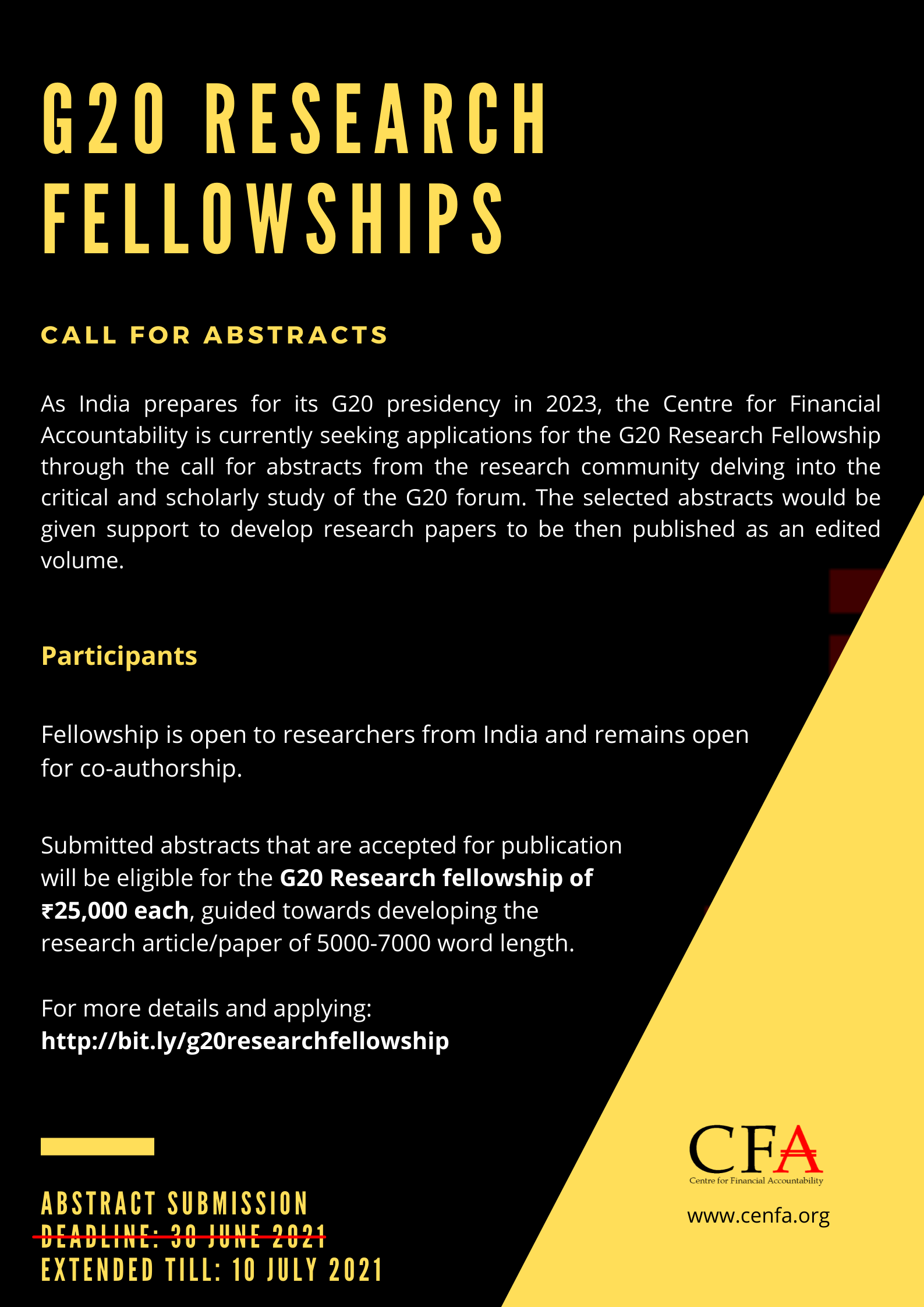 Beginning in the midst of the 2008 financial crisis, G20 started convening as an informal group of economically significant countries, now accounting for 85 percent of the world economy, 75 percent of global trade, and two-thirds of the world’s population, including more than half of the world’s poor and marginalized. The G-20 has the mandate to promote global economic growth, international trade, and regulation of financial markets. G20 along with Multilateral Development Banks shape the global financial architecture, with G20 being in a position to dictate the direction taken by IMF and MDBs.
Beginning in the midst of the 2008 financial crisis, G20 started convening as an informal group of economically significant countries, now accounting for 85 percent of the world economy, 75 percent of global trade, and two-thirds of the world’s population, including more than half of the world’s poor and marginalized. The G-20 has the mandate to promote global economic growth, international trade, and regulation of financial markets. G20 along with Multilateral Development Banks shape the global financial architecture, with G20 being in a position to dictate the direction taken by IMF and MDBs.
12 years on, and 13 summits later, in 2021, the world is at a juncture not very far away from the 2008 crisis but vulnerabilities ranging far beyond just the financial crisis and inequalities exacerbating further. The temporal factors concerning the G20 nations require critical examination on a number of fronts for India’s presidency in 2023. The G20 mandate of preserving financial stability and macroeconomic coordination cannot be tackled without diving into the questions of structural change on the global and domestic levels. As new agendas are set and more flagship issues emerge, year after year, we also see an increment in the G20 stakeholders, leading us to questions of international cooperation, governance structure, and legitimacy of the club. Critics have also questioned the efficacy of the club and its credibility to deal with pressing issues in comparison to other similar groupings, as a self-selected group of economically powerful countries. The coming together of such heavyweights also brings into question the legitimacy of other multilateral organizations and or G20’s collusion with World Bank and IMF agendas.
With this backdrop, the Centre for Financial Accountability welcomes applications for the G20 Research Fellowship through the call for abstracts from the research community delving into the critical and scholarly study of the G20 convening.
Submitted abstracts that are accepted for publication will be eligible for the G20 Research fellowship of ₹25,000 each, guided towards developing the research article/paper of 5000-7000 word length. We are looking to publish 10 scholarly articles/research papers into an edited volume or compendium.
Submissions must contribute towards a critical understanding of the G20 framework. The aim is to bring together researchers representing different disciplines and methodological approaches. Possible topics include agendas discussed in the G20 meetings like the global economic framework, infrastructure development, international taxation, international financial architecture; or priority agendas like the pandemic, climate change, disaster resilience, gender, sustainable development, migration, debt, the culture of cooperation, sectoral learnings; and/or policy discussions around the institutional structures of club governance formats, the associated comparative analysis and the questions of legitimacy regarding such forums of cooperation. This list is not all-inclusive; authors are free to submit abstracts on other topics that may be of interest to the understanding of G20 grouping.
Participants
Fellowship is open to researchers from India and remains open for co-authorship.
Submission Requirements
All submissions are to be directed via email to [fellowship@cenfa.org] with the subject line “CFA_G20 Fellowships_Abstract Submission”.
Every submission must include two required elements, as part of the email body:
- Author(s) bio/contact information – Include short biographical paragraphs (up to 150 words per author) that lists the current position, affiliation (if any), and qualifications.
- Abstract – The abstracts should reveal the purpose, problem statement, conceptual framework of the work in question, approach, etc. including five (5) keywords, and should be a minimum of 500 words and up to 750 words (excluding references).
If you have any questions, please write to [fellowship@cenfa.org] with the subject line “CFA_G20 Fellowships_Query”.
Important Dates
Previous Abstract Submission Deadline: 30 June 2021
Deadline extended till: 10 July 2021
Announcement of the Accepted Submissions: 15 July 2021
First Draft of the Manuscript Deadline: 25 August 2021
Full Manuscript Submission Deadline: 15 September 2021
Centre for Financial Accountability is now on Telegram. Click here to join our Telegram channel and stay tuned to the latest updates and insights on the economy and finance.
